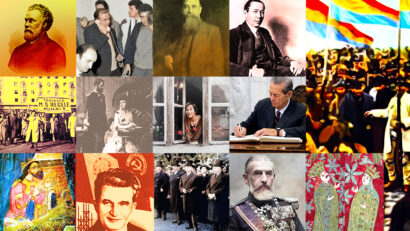Petru Groza
Petru Groza, one of the most complex of characters in the history of Romania after WWII

Steliu Lambru, 04.11.2019, 14:42
Petru Groza was one of the most complex of characters in the history of Romania after WWII. Born in 1884 in Hunedoara county, in Transylvania, Groza studied law and political economy at the universities of Budapest and Leipzig. He defended his PhD at the latter school in 1907. He practiced law as an attorney, and in politics he sided with the National Romanian Party, which militated for the rights of Romanians in Austria-Hungary. After 1918, he was active in the Peoples Party and the Plowmens Front. In the 1930s he became anti-Fascist, and worked with the Socialist Party and the Hungarian Party. During those years he also got close to the Communists, which proved decisive for his ensuing career.
On March 6, 1945, the Soviets constrained King Michael I to form a government led by Petru Groza, which was the death knell for Romanian democracy. The economy was centralized, all political parties except the Communist Party were made illegal, the monarchy dismantled, and former politicians, intellectuals, and many others were sent to jail on spurious charges. Groza was a pivotal element in the installation and functioning of the Communist regime in Romania.
After 1989, historians attempted to get as close to the truth as possible when it came to Groza, and oral history sources have made a great contribution to that endeavor. Maria Groza, his daughter, was his personal secretary and closest confidante. In 1995 she granted an interview to Radio Romanias Oral History Center, recalling the efforts made by her father to hold on to power:
“There were a lot of contradictory trends manifesting in that period of time, when the issue of agrarian reform was very much on his mind. After that came the Cluj events, raising the issue of Transylvania. Agrarian reform was a great concern for him because he didnt stand for collectivization, since along the years he got to understand what land ownership meant for the Romanian peasant. In any case, there were some circumstances that forced certain outcomes. At the same time, he was concerned a lot with relations with neighboring countries, because he was saying we may be friends with you-know-who, but we have to have good relations with our neighbors. That is when visits came from all the surrounding countries, including Moscow. I was there by his side, but I did not see Stalin, I only saw Dimitrov. We were in Moscow and we went to the opera. Father loved opera, and the Bolshoy was putting on some extraordinary shows, and in the evenings I accompanied him to the opera. On the first evening we were in the balcony, and an emissary came to invite him to see Stalin. He went to him, and they talked for a very long time. That is when they talked about prospects for Romania.”
Diplomat Pamfil Riposanu was a member of Iuliu Manius National Peasant Party, one of the parties worst hit by communist repression. He was one of Grozas close childhood friends, but they were on divergent tracks when it came to politics. In 1995 Riposanu recalled how his friend came to power in March 1945:
“While there were discussions in very advanced stages to form a coalition government, one day in March I was in the government building. Groza called me over to look out the window, and I saw Russian tanks on Victoriei Road. He asked me: What do we do now?. Meanwhile, they announced Soviet emissary Vyshinskyi. Vyshinskyi came in with a Russian general who spoke good Romanian, and was translating. Vyshinskyi told Groza: I bring a message from the great Stalin, who is asking you to please form a government. Because when you do form a government, the whole of Transylvania will be restored to Romania. The convention in Moscow signed by Visoianu said: the whole of Transylvania or the greatest part of it shall go to Romania. And Vyshinskyi said: the whole of Transylvania. Groza replied: But what does boss Stalin say? They called Stalin from the government building, and Stalin sent the following message: Tell Petru Groza that the moment he forms a government, the whole of Transylvania will go to Romania within 48 hours. Groza was deeply flushed with emotion.”
During those tense moments decisions were made that would outline the entire future of Romania. Here is Pamfil Riposanu once again:
“Romania was living the tragedy of having Transylvania divided by the Ribbentrop-Molotov Pact. Half of Transylvania was under the Hungarians. Groza told me: Im going to the palace to tell His Majesty I accept. Got to Mr. Maniu and tell him what transpired here. I convened that I would go from the Palace to Mr. Maniu, who lived across the street from Cismigiu Park. I reported to Maniu what went on with Vyshinskyi, and he turned very troubled. Two hours later Groza arrived, and he was deeply flushed and agitated. And the following discussion ensued between Groza and Maniu: Mr. President, Groza said, dont leave me alone, come with me. And Maniu said: Mr. Groza, I wont be a part of the government. And I advise you to act likewise. It would be a pity to tarnish your good name. I dont know where Mrs. Groza is, because I would call her over and beg her to prevent you from getting into this. It would be a pity to do that to your good name!. Groza got really mad, and started to bang his fist into Manius desk. Mr. President, if I am able to help my country for even five minutes, to hell with my good name! My children can change their last name for all I care!. And that is how the change came to happen.”
Petru Groza died in 1958, at 73 years of age. The regime he first headed, and to which he contributed, would survive him for 31 more years.






























